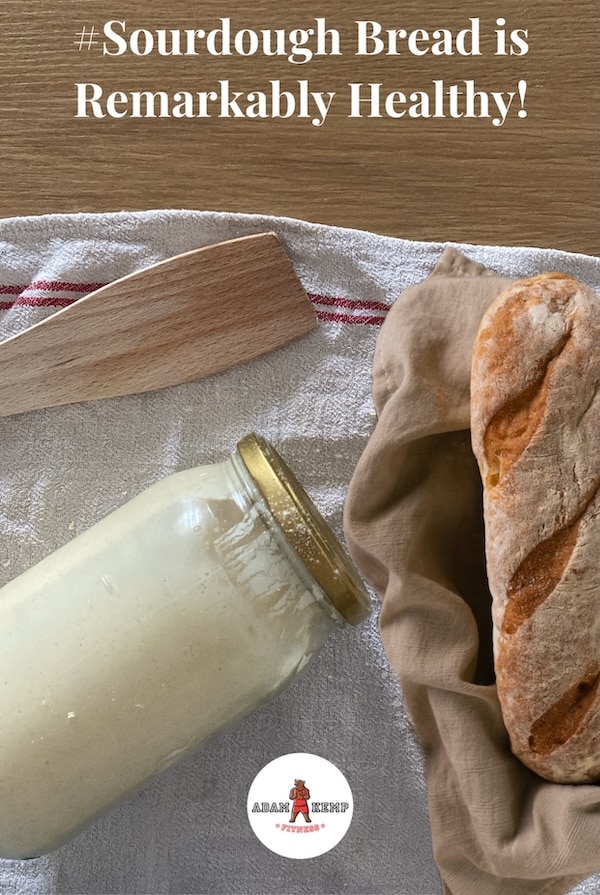Is Sourdough Bread Good for Weight Loss? Yes! Here’s Why..
Is sourdough bread good for weight loss?
Sourdough bread is great for weight loss and weight management, which is why it is my preferred bread option.
As a professional basketball player, my diet plays a crucial role in maintaining peak performance during games.
Over the years, I’ve learned the importance of choosing the right foods to fuel my body, and one standout has been sourdough bread.
Sourdough isn’t just my favorite tasting bread; it also offers substantial health benefits crucial for anyone aiming to manage their weight effectively.
What Is Sourdough Bread & How Is It Different From Other Bread?
Sourdough bread is made through a slow, natural fermentation process that uses wild yeast and lactic acid bacteria instead of commercial baker’s yeast.
This traditional method creates a dough that is easier to digest and metabolize, which is one reason people asking Is sourdough bread good for weight loss often find it fits well within a balanced nutrition plan.
The defining feature of sourdough is its starter, a mixture of flour and water that develops into a living culture.
As the microbes ferment the carbohydrates in the flour, they create organic acids and enzymes that change the structure of the bread.
These changes give sourdough several distinct advantages over conventional bread.
The natural fermentation lowers the bread’s glycemic impact, supports better satiety, and enhances its gut-friendly properties by producing prebiotic compounds.
Most commercial breads rely on quick-rise yeast that produces almost no fermentation-based benefits.
This rapid method skips the breakdown of phytic acid, offers less complex flavor, and often leads to faster blood sugar spikes that can make appetite more difficult to manage.
The longer fermentation in sourdough also partially breaks down gluten, which can make it gentler for individuals who have non-celiac gluten sensitivity but still enjoy bread.
It also increases the bioavailability of several key minerals, supporting better nutrient absorption during digestion.
Understanding these differences makes it clear why sourdough functions as more than just a flavorful bread option.
Its fermentation-driven qualities directly contribute to metabolic stability, fullness, and digestive comfort, which are valuable advantages for anyone focused on sustainable weight management.
- Sourdough vs. White Bread: Traditional white bread, made from heavily refined flour, is typically low in nutrients and fiber and can cause rapid spikes in blood sugar, leading to increased hunger and calorie consumption. Sourdough offers a more nutritious and satisfying alternative.
- Sourdough vs. Whole Grain Bread: While whole grain breads are nutritious, when these grains are used in making sourdough, the benefits are enhanced. The combination of whole grains and fermentation offers superior glycemic control and improved digestive health, presenting a compelling option for those concerned with these aspects.
How Does Sourdough Help You Lose Weight?
Here is a more information on how sourdough bread helps you lose weight:
- Lower Glycemic Index: Sourdough’s low glycemic index helps maintain balanced blood sugar levels, which is essential for preventing spikes that can lead to increased hunger and unplanned calorie intake.
- Increased Satiety: Sourdough’s fiber content helps prolong satiety, aiding in portion control, a key element in any effective weight management strategy.
- Gut Health Enhancement: The fermentation process enriches sourdough with prebiotics—food for beneficial gut bacteria. A healthy gut microbiome is crucial for effective digestion and may also influence overall mental health.
Better Digestibility
Sourdough’s hallmark is its fermentation process, which significantly enhances the bread’s digestibility and lowers its glycemic index.
This results in a moderated impact on blood sugar levels, which is crucial for dietary management and maintaining steady energy levels.
Additionally, this fermentation process breaks down gluten to some extent, which can ease digestion for those with mild gluten sensitivities (it’s not suitable for individuals with celiac disease).
Improved Nutrient Absorption
A unique aspect of sourdough bread is its ability to reduce phytic acid levels through fermentation.
Phytic acid, a natural substance found in grains and seeds, can inhibit the absorption of minerals such as iron, zinc, and calcium.
The lactic acid bacteria present in sourdough effectively break down phytic acid, thereby enhancing the bioavailability of these essential minerals.
This makes sourdough not only easier to digest but also more beneficial in terms of nutrient intake, an important factor for overall health and particularly beneficial for athletes and individuals focused on weight management.
Higher Nutrient Content
Sourdough is not just about taste; it is nutritionally rich, offering higher contents of B vitamins, iron, and magnesium compared to many other breads.
It also provides a greater amount of protein while containing less fat.
The natural fermentation process further enhances the bioavailability of these nutrients, ensuring better absorption and contributing to overall wellness.
Sourdough Buying Guide: Best Sourdough Bread for Weight Loss

Integrating sourdough into your diet is a strategic choice for anyone pursuing weight loss or aiming to maintain a healthy lifestyle.
Its unique fermentation process, coupled with its lower glycemic index and beneficial impact on gut health, positions sourdough as an outstanding bread option.
By embracing sourdough, you can indulge in its rich flavors and significantly contribute to your health and wellness goals.
To maximize the health benefits of sourdough, opt for breads made authentically with organic and high-quality ingredients.
This approach helps avoid the unnecessary additives and sugars often found in commercial products.
Additionally, making your own sourdough at home can be incredibly rewarding and allows for complete control over the ingredients, ensuring you capture all the nutritional benefits sourdough has to offer.
Local bakeries or homemade sourdough are the best options, but in the United States, I think Heidelberg Sourdough is the best sourdough brand.
Pro Tip: Eat Sourdough Avocado Toast!
Sourdough avocado toast is one of the most versatile and nutrient-dense snacks you can make, which is why it’s a staple in my family’s diet.
Not only does it taste great, but it’s also packed with essential nutrients that support overall health, making it perfect for any time of the day.
- Rich in Healthy Fats: Avocados are an excellent source of monounsaturated fats, which are beneficial for heart health. These fats help reduce bad cholesterol levels, lowering the risk of heart disease and promoting a healthier cardiovascular system. Combined with the high-quality fats in hemp seeds, avocado toast provides a balanced and heart-healthy snack.
- High in Dietary Fiber: Both avocados and the whole grain bread used for avocado toast contribute to its high fiber content. Fiber is crucial for digestive health as it acts as a prebiotic, feeding the good bacteria in your gut and supporting long-term overall well-being. It also helps regulate blood sugar levels and keeps you feeling full, which is particularly beneficial for weight management.
- Packed with Essential Nutrients: Avocado toast is rich in potassium, a vital mineral for maintaining proper heart and muscle function. The combination of avocado, whole grain bread, and hemp seeds also supplies a variety of vitamins, minerals, and antioxidants that support overall health, making it a powerhouse snack or meal option.
What makes avocado toast even more appealing to me is its adaptability.
Whether enjoyed as a quick breakfast, a filling lunch, or a satisfying evening snack, ssourdough avocado toast is a delicious way to fuel your body with essential nutrients while keeping your energy levels steady.
The combination of taste, convenience, and nutritional benefits makes avocado toast, especially when paired with sourdough bread, my go-to option for a quick, healthy, and satisfying meal that the whole family loves.
Final Thoughts: Sourdough Bread for Weight Loss

Sourdough bread isn’t just a tool for weight loss; it’s also a key player in sustainable weight management.
The unique fermentation process that gives sourdough its distinctive flavor also slows down the digestion of carbohydrates, leading to a more gradual release of glucose into the bloodstream.
This steady energy supply helps to control hunger and reduces the likelihood of sudden cravings, making it easier to maintain a balanced diet throughout the day.
By promoting satiety and preventing overeating, sourdough encourages more mindful eating habits.
Unlike many restrictive diets that can leave you feeling deprived, incorporating sourdough into your meals allows you to enjoy delicious, satisfying food while still working towards your health and weight goals.
This balance is crucial for long-term success in weight management, as it supports a sustainable lifestyle rather than a short-term fix.
Incorporating sourdough into your diet is a small change that can lead to significant results.
Whether you’re enjoying a slice with breakfast or using it as the base for a nutritious sandwich, sourdough offers a way to enjoy your meals while staying on track with your health objectives!
Read Next: Is Dave’s Killer Bread Healthy?
This website does not provide medical advice. This website site does contain affiliate links, and purchases may earn a commission.
Read my Medical Disclaimer, Review Disclaimer, and Publishing Policies for more details. Use of this site indicates acceptance of these terms.



